Performance Measurement in Organizations: Evaluation of British Heart Foundation
VerifiedAdded on 2023/06/09
|13
|3210
|291
AI Summary
This essay evaluates the financial and non-financial performance of British Heart Foundation through analyzing its annual reports. It includes financial ratio analysis and non-financial analysis through Key Performance Indicators (KPIs). The essay also discusses the sustainability of non-profit organizations and their focus on balancing mission and money.
Contribute Materials
Your contribution can guide someone’s learning journey. Share your
documents today.
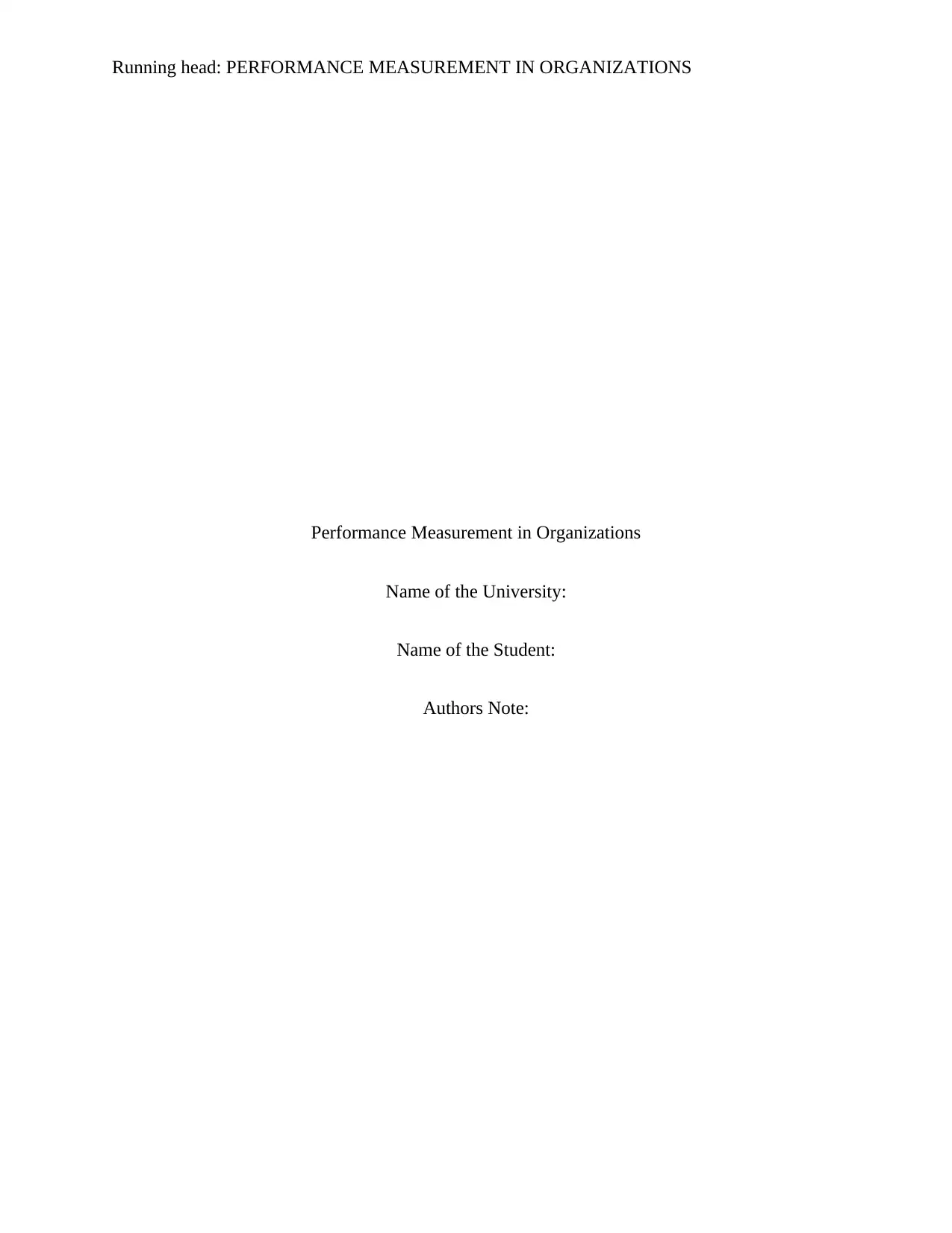
Running head: PERFORMANCE MEASUREMENT IN ORGANIZATIONS
Performance Measurement in Organizations
Name of the University:
Name of the Student:
Authors Note:
Performance Measurement in Organizations
Name of the University:
Name of the Student:
Authors Note:
Secure Best Marks with AI Grader
Need help grading? Try our AI Grader for instant feedback on your assignments.
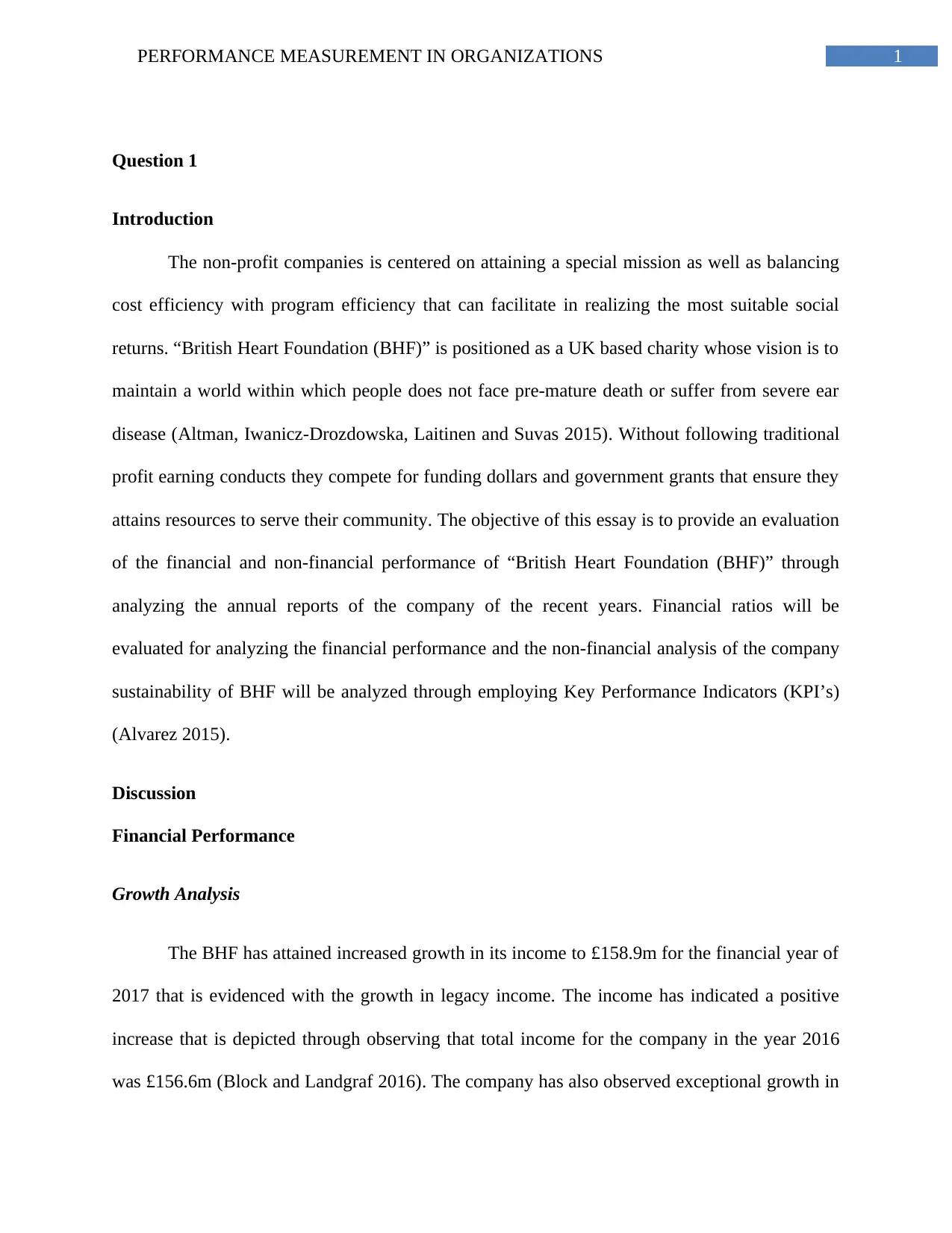
1PERFORMANCE MEASUREMENT IN ORGANIZATIONS
Question 1
Introduction
The non-profit companies is centered on attaining a special mission as well as balancing
cost efficiency with program efficiency that can facilitate in realizing the most suitable social
returns. “British Heart Foundation (BHF)” is positioned as a UK based charity whose vision is to
maintain a world within which people does not face pre-mature death or suffer from severe ear
disease (Altman, Iwanicz-Drozdowska, Laitinen and Suvas 2015). Without following traditional
profit earning conducts they compete for funding dollars and government grants that ensure they
attains resources to serve their community. The objective of this essay is to provide an evaluation
of the financial and non-financial performance of “British Heart Foundation (BHF)” through
analyzing the annual reports of the company of the recent years. Financial ratios will be
evaluated for analyzing the financial performance and the non-financial analysis of the company
sustainability of BHF will be analyzed through employing Key Performance Indicators (KPI’s)
(Alvarez 2015).
Discussion
Financial Performance
Growth Analysis
The BHF has attained increased growth in its income to £158.9m for the financial year of
2017 that is evidenced with the growth in legacy income. The income has indicated a positive
increase that is depicted through observing that total income for the company in the year 2016
was £156.6m (Block and Landgraf 2016). The company has also observed exceptional growth in
Question 1
Introduction
The non-profit companies is centered on attaining a special mission as well as balancing
cost efficiency with program efficiency that can facilitate in realizing the most suitable social
returns. “British Heart Foundation (BHF)” is positioned as a UK based charity whose vision is to
maintain a world within which people does not face pre-mature death or suffer from severe ear
disease (Altman, Iwanicz-Drozdowska, Laitinen and Suvas 2015). Without following traditional
profit earning conducts they compete for funding dollars and government grants that ensure they
attains resources to serve their community. The objective of this essay is to provide an evaluation
of the financial and non-financial performance of “British Heart Foundation (BHF)” through
analyzing the annual reports of the company of the recent years. Financial ratios will be
evaluated for analyzing the financial performance and the non-financial analysis of the company
sustainability of BHF will be analyzed through employing Key Performance Indicators (KPI’s)
(Alvarez 2015).
Discussion
Financial Performance
Growth Analysis
The BHF has attained increased growth in its income to £158.9m for the financial year of
2017 that is evidenced with the growth in legacy income. The income has indicated a positive
increase that is depicted through observing that total income for the company in the year 2016
was £156.6m (Block and Landgraf 2016). The company has also observed exceptional growth in
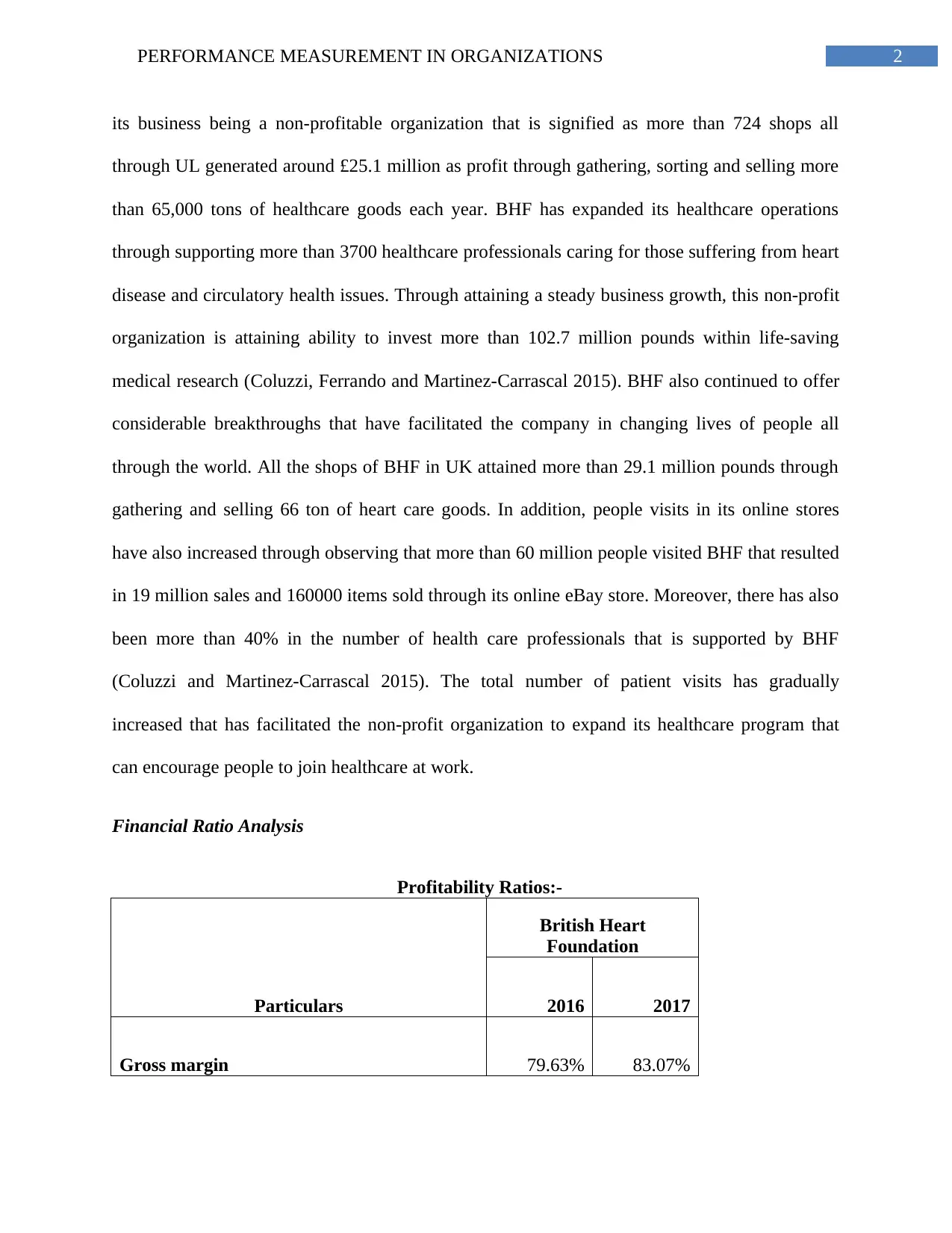
2PERFORMANCE MEASUREMENT IN ORGANIZATIONS
its business being a non-profitable organization that is signified as more than 724 shops all
through UL generated around £25.1 million as profit through gathering, sorting and selling more
than 65,000 tons of healthcare goods each year. BHF has expanded its healthcare operations
through supporting more than 3700 healthcare professionals caring for those suffering from heart
disease and circulatory health issues. Through attaining a steady business growth, this non-profit
organization is attaining ability to invest more than 102.7 million pounds within life-saving
medical research (Coluzzi, Ferrando and Martinez-Carrascal 2015). BHF also continued to offer
considerable breakthroughs that have facilitated the company in changing lives of people all
through the world. All the shops of BHF in UK attained more than 29.1 million pounds through
gathering and selling 66 ton of heart care goods. In addition, people visits in its online stores
have also increased through observing that more than 60 million people visited BHF that resulted
in 19 million sales and 160000 items sold through its online eBay store. Moreover, there has also
been more than 40% in the number of health care professionals that is supported by BHF
(Coluzzi and Martinez-Carrascal 2015). The total number of patient visits has gradually
increased that has facilitated the non-profit organization to expand its healthcare program that
can encourage people to join healthcare at work.
Financial Ratio Analysis
Profitability Ratios:-
Particulars
British Heart
Foundation
2016 2017
Gross margin 79.63% 83.07%
its business being a non-profitable organization that is signified as more than 724 shops all
through UL generated around £25.1 million as profit through gathering, sorting and selling more
than 65,000 tons of healthcare goods each year. BHF has expanded its healthcare operations
through supporting more than 3700 healthcare professionals caring for those suffering from heart
disease and circulatory health issues. Through attaining a steady business growth, this non-profit
organization is attaining ability to invest more than 102.7 million pounds within life-saving
medical research (Coluzzi, Ferrando and Martinez-Carrascal 2015). BHF also continued to offer
considerable breakthroughs that have facilitated the company in changing lives of people all
through the world. All the shops of BHF in UK attained more than 29.1 million pounds through
gathering and selling 66 ton of heart care goods. In addition, people visits in its online stores
have also increased through observing that more than 60 million people visited BHF that resulted
in 19 million sales and 160000 items sold through its online eBay store. Moreover, there has also
been more than 40% in the number of health care professionals that is supported by BHF
(Coluzzi and Martinez-Carrascal 2015). The total number of patient visits has gradually
increased that has facilitated the non-profit organization to expand its healthcare program that
can encourage people to join healthcare at work.
Financial Ratio Analysis
Profitability Ratios:-
Particulars
British Heart
Foundation
2016 2017
Gross margin 79.63% 83.07%
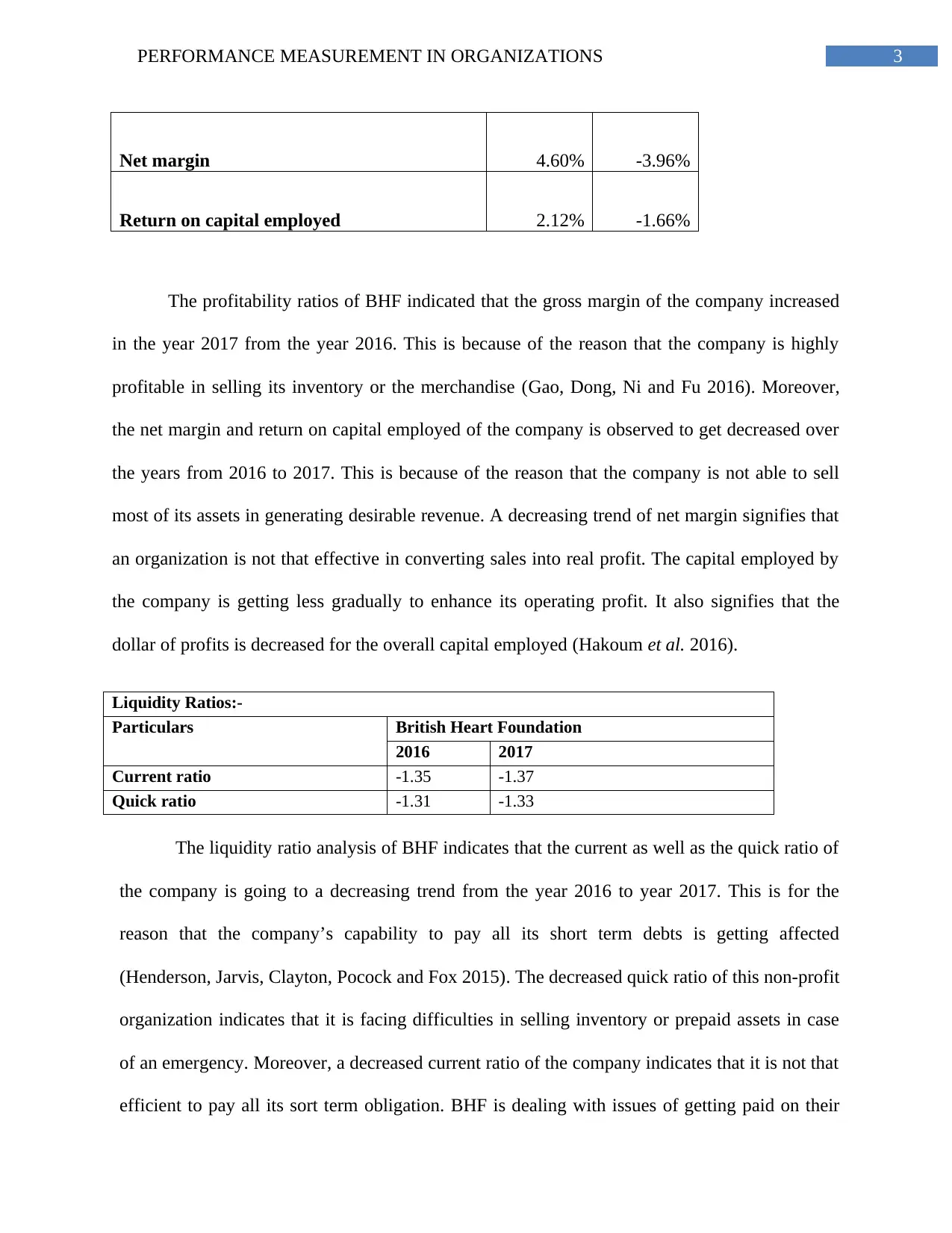
3PERFORMANCE MEASUREMENT IN ORGANIZATIONS
Net margin 4.60% -3.96%
Return on capital employed 2.12% -1.66%
The profitability ratios of BHF indicated that the gross margin of the company increased
in the year 2017 from the year 2016. This is because of the reason that the company is highly
profitable in selling its inventory or the merchandise (Gao, Dong, Ni and Fu 2016). Moreover,
the net margin and return on capital employed of the company is observed to get decreased over
the years from 2016 to 2017. This is because of the reason that the company is not able to sell
most of its assets in generating desirable revenue. A decreasing trend of net margin signifies that
an organization is not that effective in converting sales into real profit. The capital employed by
the company is getting less gradually to enhance its operating profit. It also signifies that the
dollar of profits is decreased for the overall capital employed (Hakoum et al. 2016).
Liquidity Ratios:-
Particulars British Heart Foundation
2016 2017
Current ratio -1.35 -1.37
Quick ratio -1.31 -1.33
The liquidity ratio analysis of BHF indicates that the current as well as the quick ratio of
the company is going to a decreasing trend from the year 2016 to year 2017. This is for the
reason that the company’s capability to pay all its short term debts is getting affected
(Henderson, Jarvis, Clayton, Pocock and Fox 2015). The decreased quick ratio of this non-profit
organization indicates that it is facing difficulties in selling inventory or prepaid assets in case
of an emergency. Moreover, a decreased current ratio of the company indicates that it is not that
efficient to pay all its sort term obligation. BHF is dealing with issues of getting paid on their
Net margin 4.60% -3.96%
Return on capital employed 2.12% -1.66%
The profitability ratios of BHF indicated that the gross margin of the company increased
in the year 2017 from the year 2016. This is because of the reason that the company is highly
profitable in selling its inventory or the merchandise (Gao, Dong, Ni and Fu 2016). Moreover,
the net margin and return on capital employed of the company is observed to get decreased over
the years from 2016 to 2017. This is because of the reason that the company is not able to sell
most of its assets in generating desirable revenue. A decreasing trend of net margin signifies that
an organization is not that effective in converting sales into real profit. The capital employed by
the company is getting less gradually to enhance its operating profit. It also signifies that the
dollar of profits is decreased for the overall capital employed (Hakoum et al. 2016).
Liquidity Ratios:-
Particulars British Heart Foundation
2016 2017
Current ratio -1.35 -1.37
Quick ratio -1.31 -1.33
The liquidity ratio analysis of BHF indicates that the current as well as the quick ratio of
the company is going to a decreasing trend from the year 2016 to year 2017. This is for the
reason that the company’s capability to pay all its short term debts is getting affected
(Henderson, Jarvis, Clayton, Pocock and Fox 2015). The decreased quick ratio of this non-profit
organization indicates that it is facing difficulties in selling inventory or prepaid assets in case
of an emergency. Moreover, a decreased current ratio of the company indicates that it is not that
efficient to pay all its sort term obligation. BHF is dealing with issues of getting paid on their
Secure Best Marks with AI Grader
Need help grading? Try our AI Grader for instant feedback on your assignments.
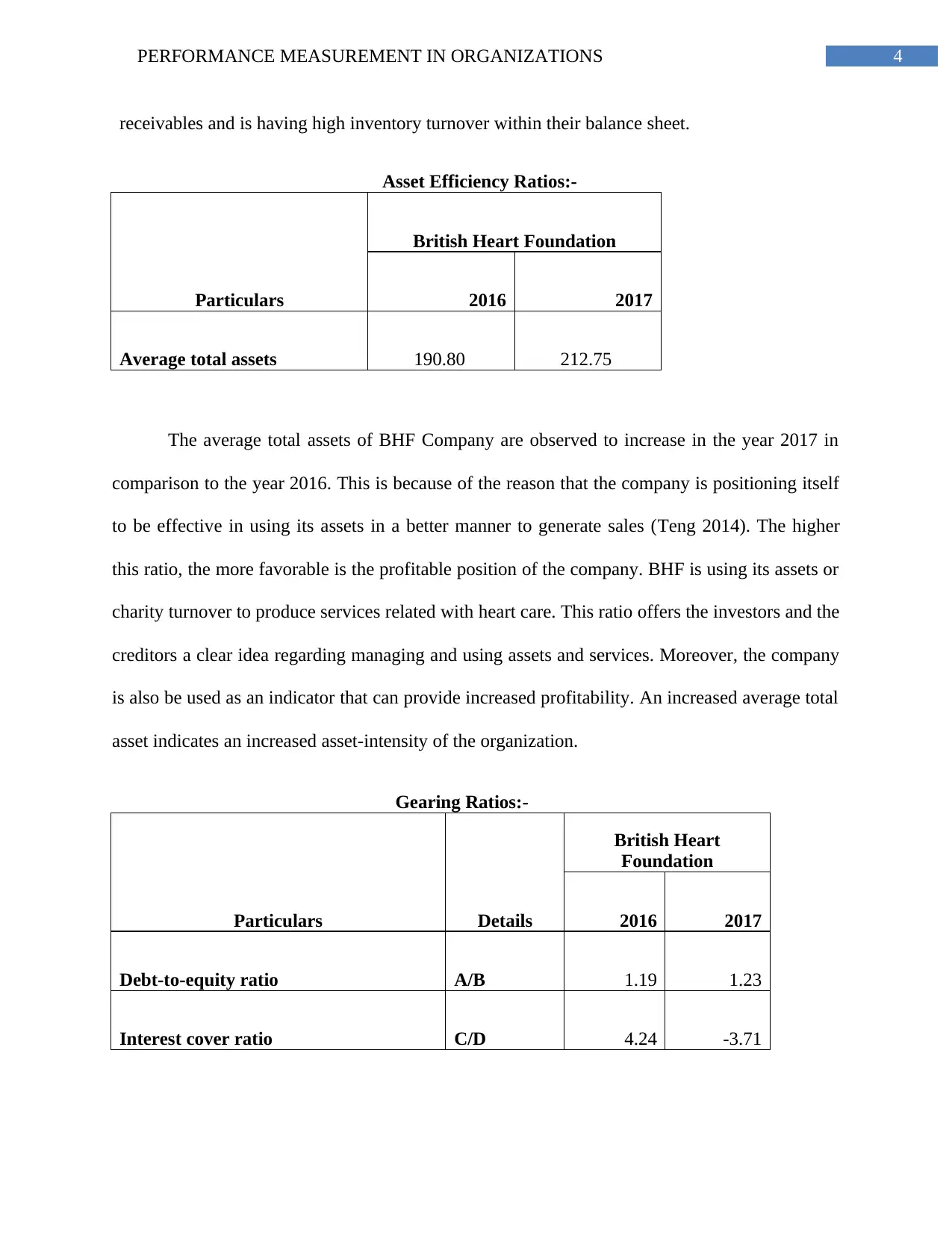
4PERFORMANCE MEASUREMENT IN ORGANIZATIONS
receivables and is having high inventory turnover within their balance sheet.
Asset Efficiency Ratios:-
Particulars
British Heart Foundation
2016 2017
Average total assets 190.80 212.75
The average total assets of BHF Company are observed to increase in the year 2017 in
comparison to the year 2016. This is because of the reason that the company is positioning itself
to be effective in using its assets in a better manner to generate sales (Teng 2014). The higher
this ratio, the more favorable is the profitable position of the company. BHF is using its assets or
charity turnover to produce services related with heart care. This ratio offers the investors and the
creditors a clear idea regarding managing and using assets and services. Moreover, the company
is also be used as an indicator that can provide increased profitability. An increased average total
asset indicates an increased asset-intensity of the organization.
Gearing Ratios:-
Particulars Details
British Heart
Foundation
2016 2017
Debt-to-equity ratio A/B 1.19 1.23
Interest cover ratio C/D 4.24 -3.71
receivables and is having high inventory turnover within their balance sheet.
Asset Efficiency Ratios:-
Particulars
British Heart Foundation
2016 2017
Average total assets 190.80 212.75
The average total assets of BHF Company are observed to increase in the year 2017 in
comparison to the year 2016. This is because of the reason that the company is positioning itself
to be effective in using its assets in a better manner to generate sales (Teng 2014). The higher
this ratio, the more favorable is the profitable position of the company. BHF is using its assets or
charity turnover to produce services related with heart care. This ratio offers the investors and the
creditors a clear idea regarding managing and using assets and services. Moreover, the company
is also be used as an indicator that can provide increased profitability. An increased average total
asset indicates an increased asset-intensity of the organization.
Gearing Ratios:-
Particulars Details
British Heart
Foundation
2016 2017
Debt-to-equity ratio A/B 1.19 1.23
Interest cover ratio C/D 4.24 -3.71
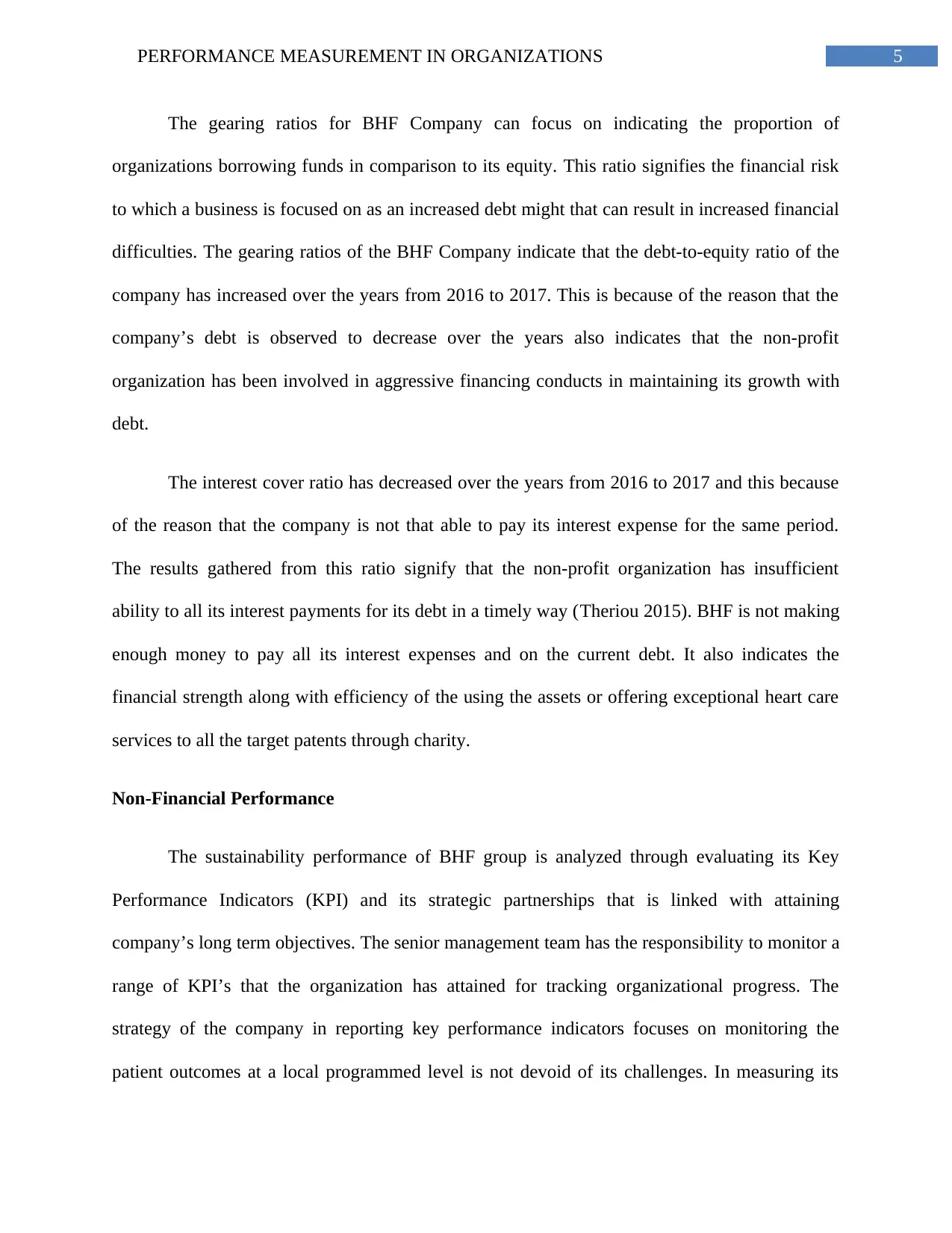
5PERFORMANCE MEASUREMENT IN ORGANIZATIONS
The gearing ratios for BHF Company can focus on indicating the proportion of
organizations borrowing funds in comparison to its equity. This ratio signifies the financial risk
to which a business is focused on as an increased debt might that can result in increased financial
difficulties. The gearing ratios of the BHF Company indicate that the debt-to-equity ratio of the
company has increased over the years from 2016 to 2017. This is because of the reason that the
company’s debt is observed to decrease over the years also indicates that the non-profit
organization has been involved in aggressive financing conducts in maintaining its growth with
debt.
The interest cover ratio has decreased over the years from 2016 to 2017 and this because
of the reason that the company is not that able to pay its interest expense for the same period.
The results gathered from this ratio signify that the non-profit organization has insufficient
ability to all its interest payments for its debt in a timely way (Theriou 2015). BHF is not making
enough money to pay all its interest expenses and on the current debt. It also indicates the
financial strength along with efficiency of the using the assets or offering exceptional heart care
services to all the target patents through charity.
Non-Financial Performance
The sustainability performance of BHF group is analyzed through evaluating its Key
Performance Indicators (KPI) and its strategic partnerships that is linked with attaining
company’s long term objectives. The senior management team has the responsibility to monitor a
range of KPI’s that the organization has attained for tracking organizational progress. The
strategy of the company in reporting key performance indicators focuses on monitoring the
patient outcomes at a local programmed level is not devoid of its challenges. In measuring its
The gearing ratios for BHF Company can focus on indicating the proportion of
organizations borrowing funds in comparison to its equity. This ratio signifies the financial risk
to which a business is focused on as an increased debt might that can result in increased financial
difficulties. The gearing ratios of the BHF Company indicate that the debt-to-equity ratio of the
company has increased over the years from 2016 to 2017. This is because of the reason that the
company’s debt is observed to decrease over the years also indicates that the non-profit
organization has been involved in aggressive financing conducts in maintaining its growth with
debt.
The interest cover ratio has decreased over the years from 2016 to 2017 and this because
of the reason that the company is not that able to pay its interest expense for the same period.
The results gathered from this ratio signify that the non-profit organization has insufficient
ability to all its interest payments for its debt in a timely way (Theriou 2015). BHF is not making
enough money to pay all its interest expenses and on the current debt. It also indicates the
financial strength along with efficiency of the using the assets or offering exceptional heart care
services to all the target patents through charity.
Non-Financial Performance
The sustainability performance of BHF group is analyzed through evaluating its Key
Performance Indicators (KPI) and its strategic partnerships that is linked with attaining
company’s long term objectives. The senior management team has the responsibility to monitor a
range of KPI’s that the organization has attained for tracking organizational progress. The
strategy of the company in reporting key performance indicators focuses on monitoring the
patient outcomes at a local programmed level is not devoid of its challenges. In measuring its
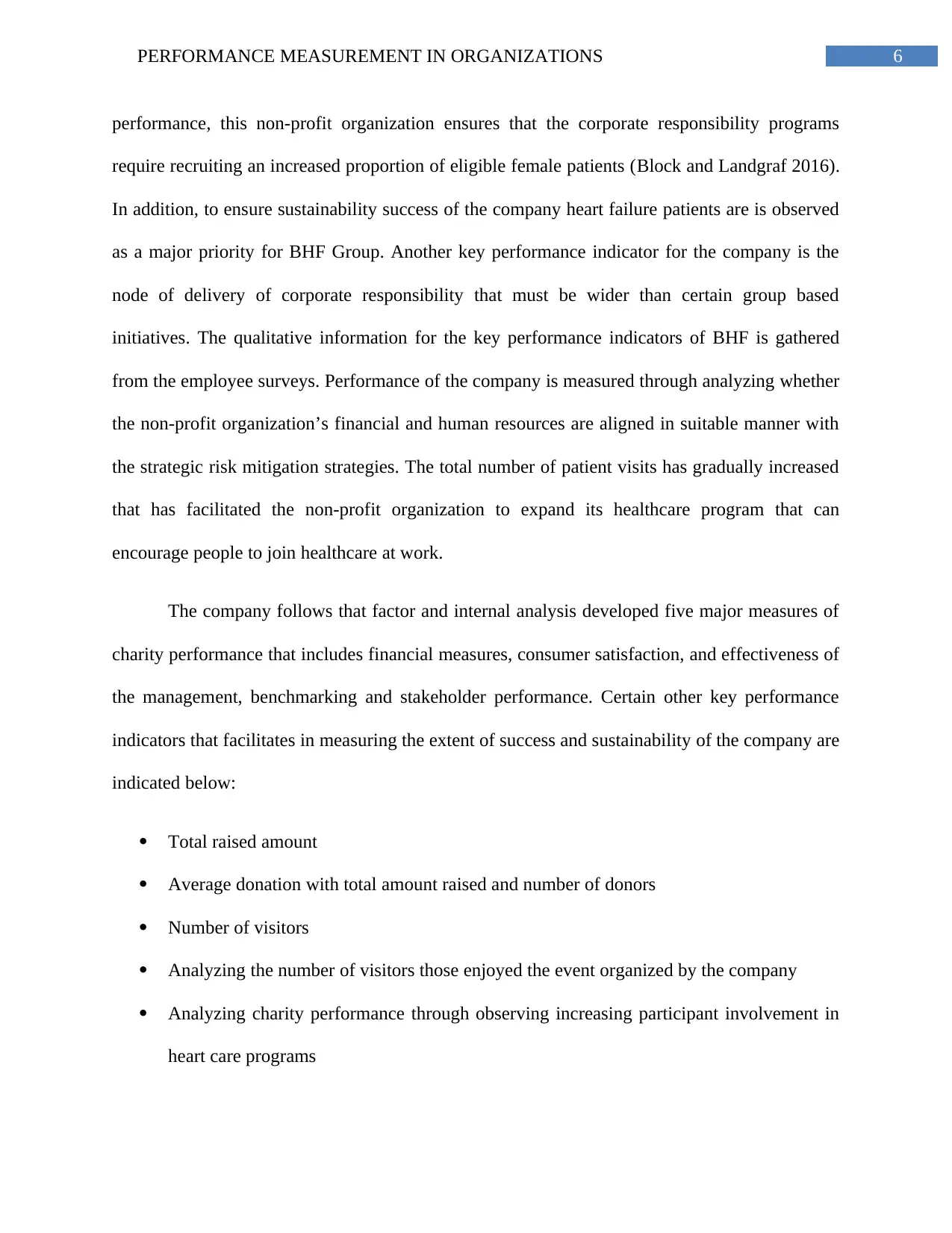
6PERFORMANCE MEASUREMENT IN ORGANIZATIONS
performance, this non-profit organization ensures that the corporate responsibility programs
require recruiting an increased proportion of eligible female patients (Block and Landgraf 2016).
In addition, to ensure sustainability success of the company heart failure patients are is observed
as a major priority for BHF Group. Another key performance indicator for the company is the
node of delivery of corporate responsibility that must be wider than certain group based
initiatives. The qualitative information for the key performance indicators of BHF is gathered
from the employee surveys. Performance of the company is measured through analyzing whether
the non-profit organization’s financial and human resources are aligned in suitable manner with
the strategic risk mitigation strategies. The total number of patient visits has gradually increased
that has facilitated the non-profit organization to expand its healthcare program that can
encourage people to join healthcare at work.
The company follows that factor and internal analysis developed five major measures of
charity performance that includes financial measures, consumer satisfaction, and effectiveness of
the management, benchmarking and stakeholder performance. Certain other key performance
indicators that facilitates in measuring the extent of success and sustainability of the company are
indicated below:
Total raised amount
Average donation with total amount raised and number of donors
Number of visitors
Analyzing the number of visitors those enjoyed the event organized by the company
Analyzing charity performance through observing increasing participant involvement in
heart care programs
performance, this non-profit organization ensures that the corporate responsibility programs
require recruiting an increased proportion of eligible female patients (Block and Landgraf 2016).
In addition, to ensure sustainability success of the company heart failure patients are is observed
as a major priority for BHF Group. Another key performance indicator for the company is the
node of delivery of corporate responsibility that must be wider than certain group based
initiatives. The qualitative information for the key performance indicators of BHF is gathered
from the employee surveys. Performance of the company is measured through analyzing whether
the non-profit organization’s financial and human resources are aligned in suitable manner with
the strategic risk mitigation strategies. The total number of patient visits has gradually increased
that has facilitated the non-profit organization to expand its healthcare program that can
encourage people to join healthcare at work.
The company follows that factor and internal analysis developed five major measures of
charity performance that includes financial measures, consumer satisfaction, and effectiveness of
the management, benchmarking and stakeholder performance. Certain other key performance
indicators that facilitates in measuring the extent of success and sustainability of the company are
indicated below:
Total raised amount
Average donation with total amount raised and number of donors
Number of visitors
Analyzing the number of visitors those enjoyed the event organized by the company
Analyzing charity performance through observing increasing participant involvement in
heart care programs
Paraphrase This Document
Need a fresh take? Get an instant paraphrase of this document with our AI Paraphraser
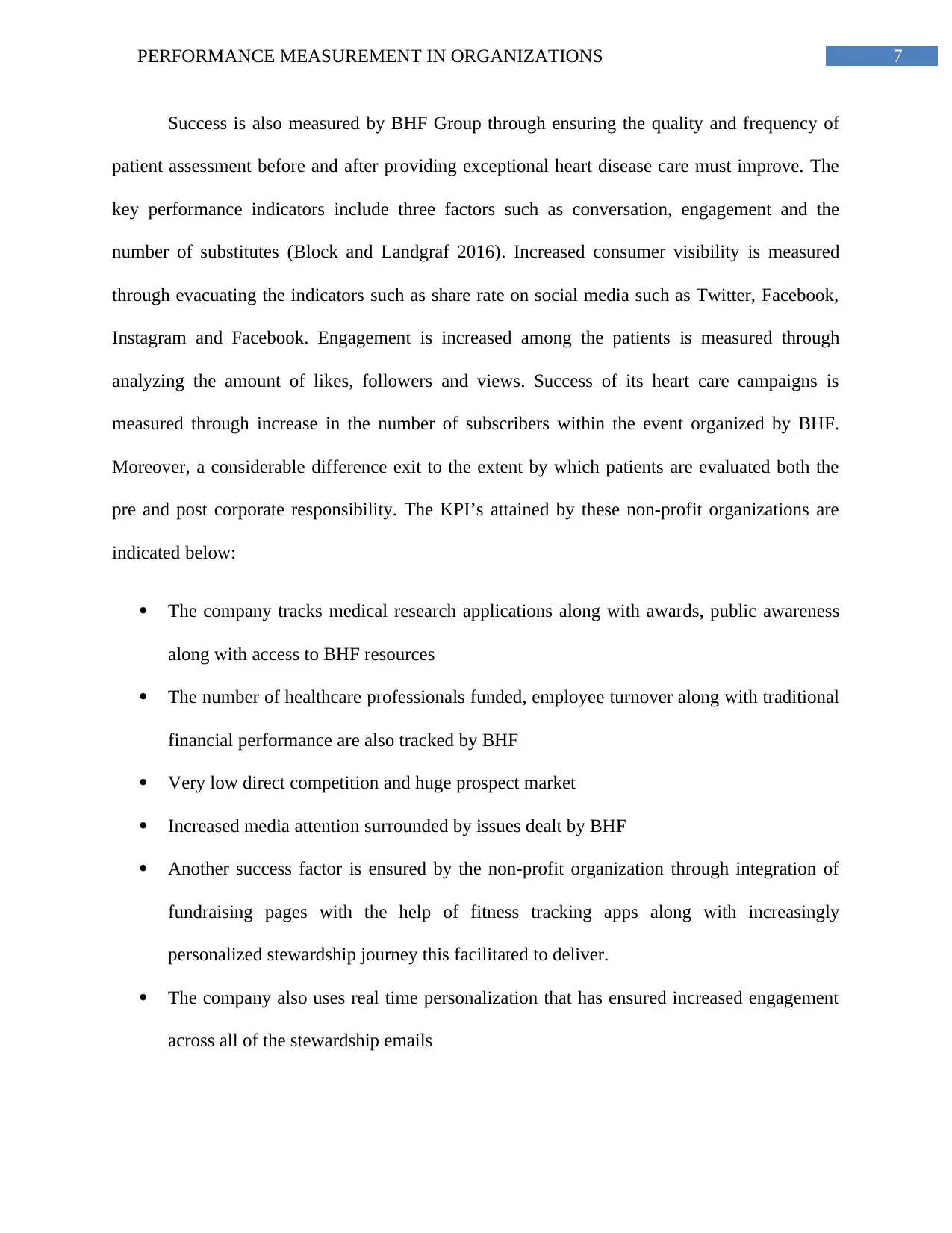
7PERFORMANCE MEASUREMENT IN ORGANIZATIONS
Success is also measured by BHF Group through ensuring the quality and frequency of
patient assessment before and after providing exceptional heart disease care must improve. The
key performance indicators include three factors such as conversation, engagement and the
number of substitutes (Block and Landgraf 2016). Increased consumer visibility is measured
through evacuating the indicators such as share rate on social media such as Twitter, Facebook,
Instagram and Facebook. Engagement is increased among the patients is measured through
analyzing the amount of likes, followers and views. Success of its heart care campaigns is
measured through increase in the number of subscribers within the event organized by BHF.
Moreover, a considerable difference exit to the extent by which patients are evaluated both the
pre and post corporate responsibility. The KPI’s attained by these non-profit organizations are
indicated below:
The company tracks medical research applications along with awards, public awareness
along with access to BHF resources
The number of healthcare professionals funded, employee turnover along with traditional
financial performance are also tracked by BHF
Very low direct competition and huge prospect market
Increased media attention surrounded by issues dealt by BHF
Another success factor is ensured by the non-profit organization through integration of
fundraising pages with the help of fitness tracking apps along with increasingly
personalized stewardship journey this facilitated to deliver.
The company also uses real time personalization that has ensured increased engagement
across all of the stewardship emails
Success is also measured by BHF Group through ensuring the quality and frequency of
patient assessment before and after providing exceptional heart disease care must improve. The
key performance indicators include three factors such as conversation, engagement and the
number of substitutes (Block and Landgraf 2016). Increased consumer visibility is measured
through evacuating the indicators such as share rate on social media such as Twitter, Facebook,
Instagram and Facebook. Engagement is increased among the patients is measured through
analyzing the amount of likes, followers and views. Success of its heart care campaigns is
measured through increase in the number of subscribers within the event organized by BHF.
Moreover, a considerable difference exit to the extent by which patients are evaluated both the
pre and post corporate responsibility. The KPI’s attained by these non-profit organizations are
indicated below:
The company tracks medical research applications along with awards, public awareness
along with access to BHF resources
The number of healthcare professionals funded, employee turnover along with traditional
financial performance are also tracked by BHF
Very low direct competition and huge prospect market
Increased media attention surrounded by issues dealt by BHF
Another success factor is ensured by the non-profit organization through integration of
fundraising pages with the help of fitness tracking apps along with increasingly
personalized stewardship journey this facilitated to deliver.
The company also uses real time personalization that has ensured increased engagement
across all of the stewardship emails
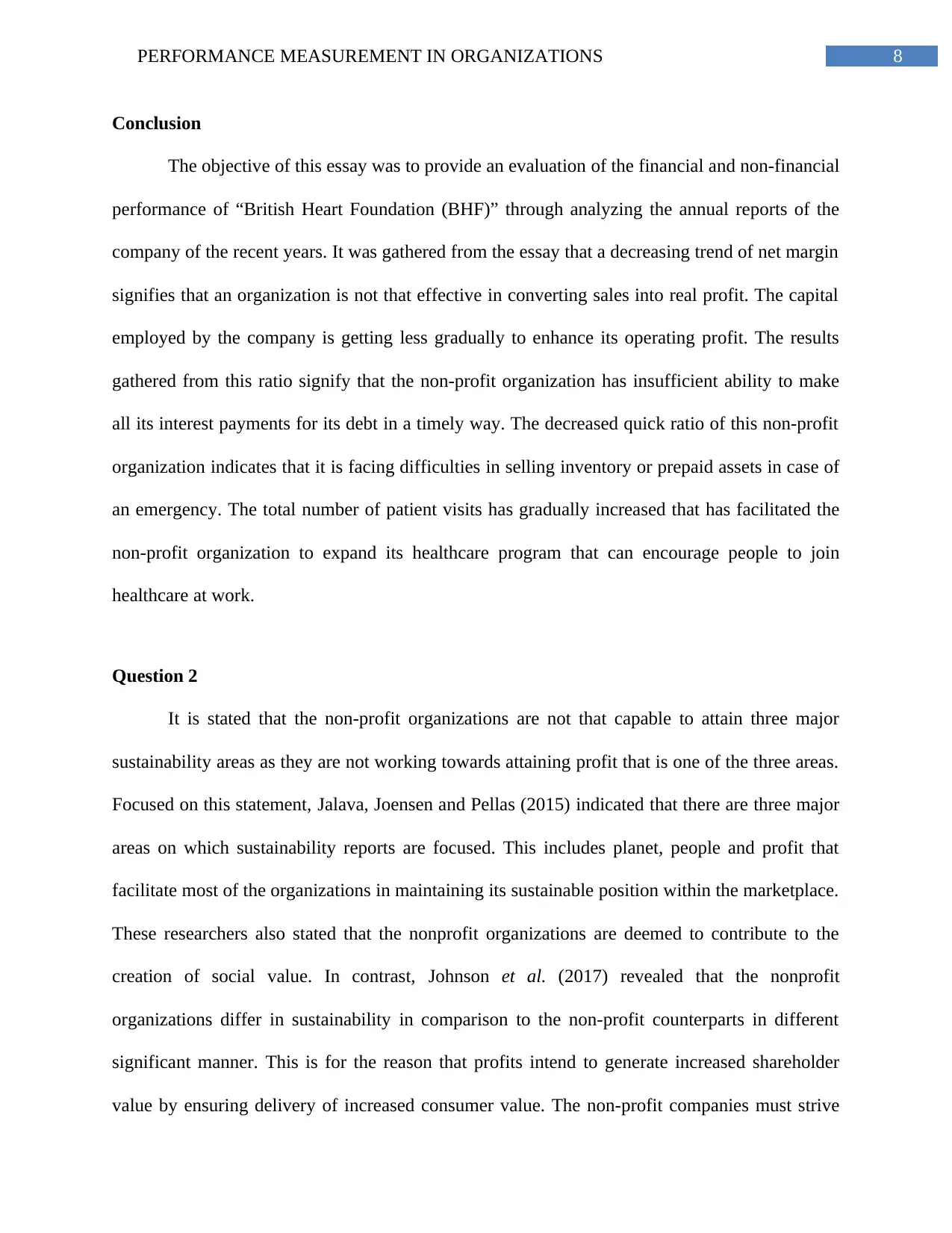
8PERFORMANCE MEASUREMENT IN ORGANIZATIONS
Conclusion
The objective of this essay was to provide an evaluation of the financial and non-financial
performance of “British Heart Foundation (BHF)” through analyzing the annual reports of the
company of the recent years. It was gathered from the essay that a decreasing trend of net margin
signifies that an organization is not that effective in converting sales into real profit. The capital
employed by the company is getting less gradually to enhance its operating profit. The results
gathered from this ratio signify that the non-profit organization has insufficient ability to make
all its interest payments for its debt in a timely way. The decreased quick ratio of this non-profit
organization indicates that it is facing difficulties in selling inventory or prepaid assets in case of
an emergency. The total number of patient visits has gradually increased that has facilitated the
non-profit organization to expand its healthcare program that can encourage people to join
healthcare at work.
Question 2
It is stated that the non-profit organizations are not that capable to attain three major
sustainability areas as they are not working towards attaining profit that is one of the three areas.
Focused on this statement, Jalava, Joensen and Pellas (2015) indicated that there are three major
areas on which sustainability reports are focused. This includes planet, people and profit that
facilitate most of the organizations in maintaining its sustainable position within the marketplace.
These researchers also stated that the nonprofit organizations are deemed to contribute to the
creation of social value. In contrast, Johnson et al. (2017) revealed that the nonprofit
organizations differ in sustainability in comparison to the non-profit counterparts in different
significant manner. This is for the reason that profits intend to generate increased shareholder
value by ensuring delivery of increased consumer value. The non-profit companies must strive
Conclusion
The objective of this essay was to provide an evaluation of the financial and non-financial
performance of “British Heart Foundation (BHF)” through analyzing the annual reports of the
company of the recent years. It was gathered from the essay that a decreasing trend of net margin
signifies that an organization is not that effective in converting sales into real profit. The capital
employed by the company is getting less gradually to enhance its operating profit. The results
gathered from this ratio signify that the non-profit organization has insufficient ability to make
all its interest payments for its debt in a timely way. The decreased quick ratio of this non-profit
organization indicates that it is facing difficulties in selling inventory or prepaid assets in case of
an emergency. The total number of patient visits has gradually increased that has facilitated the
non-profit organization to expand its healthcare program that can encourage people to join
healthcare at work.
Question 2
It is stated that the non-profit organizations are not that capable to attain three major
sustainability areas as they are not working towards attaining profit that is one of the three areas.
Focused on this statement, Jalava, Joensen and Pellas (2015) indicated that there are three major
areas on which sustainability reports are focused. This includes planet, people and profit that
facilitate most of the organizations in maintaining its sustainable position within the marketplace.
These researchers also stated that the nonprofit organizations are deemed to contribute to the
creation of social value. In contrast, Johnson et al. (2017) revealed that the nonprofit
organizations differ in sustainability in comparison to the non-profit counterparts in different
significant manner. This is for the reason that profits intend to generate increased shareholder
value by ensuring delivery of increased consumer value. The non-profit companies must strive
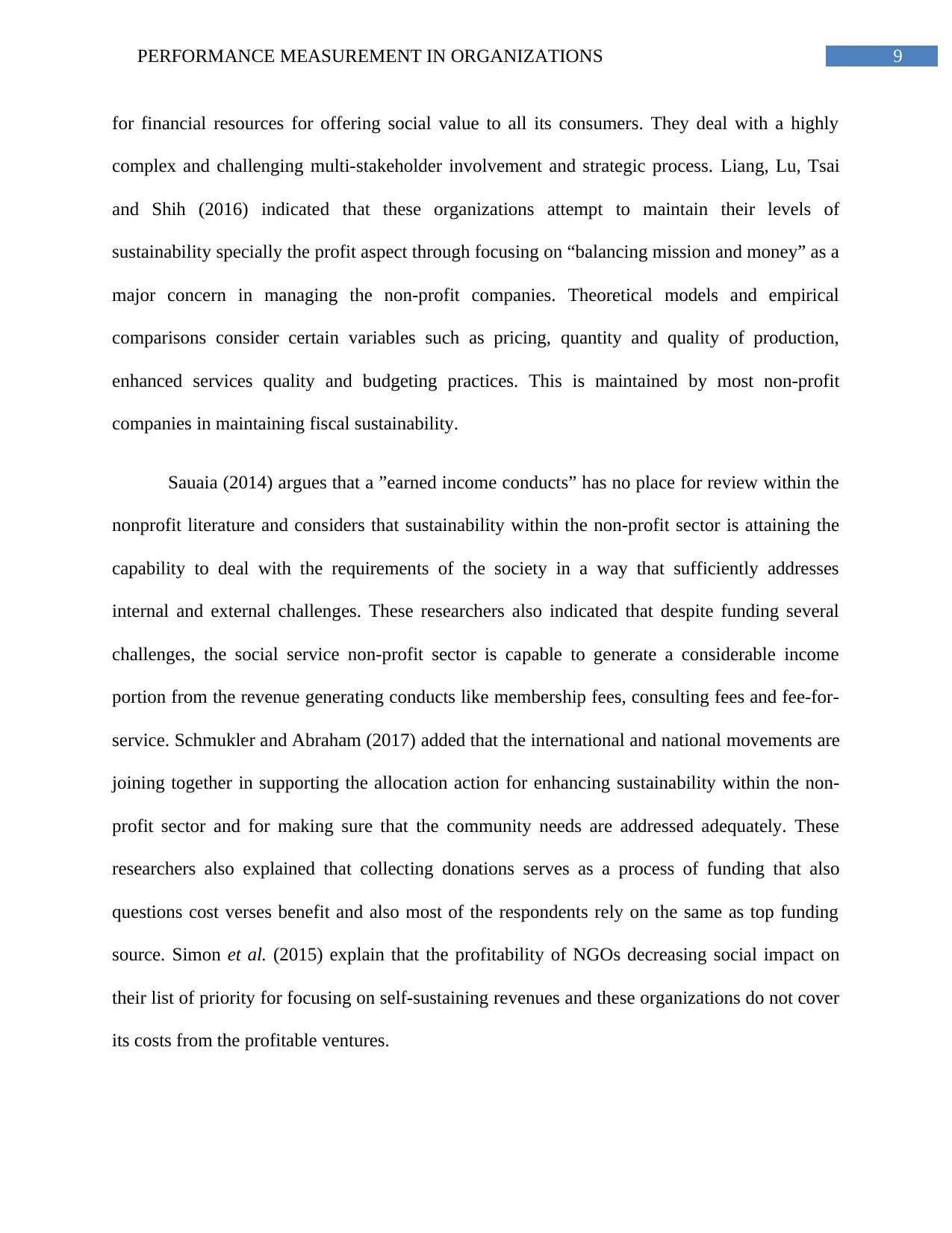
9PERFORMANCE MEASUREMENT IN ORGANIZATIONS
for financial resources for offering social value to all its consumers. They deal with a highly
complex and challenging multi-stakeholder involvement and strategic process. Liang, Lu, Tsai
and Shih (2016) indicated that these organizations attempt to maintain their levels of
sustainability specially the profit aspect through focusing on “balancing mission and money” as a
major concern in managing the non-profit companies. Theoretical models and empirical
comparisons consider certain variables such as pricing, quantity and quality of production,
enhanced services quality and budgeting practices. This is maintained by most non-profit
companies in maintaining fiscal sustainability.
Sauaia (2014) argues that a ”earned income conducts” has no place for review within the
nonprofit literature and considers that sustainability within the non-profit sector is attaining the
capability to deal with the requirements of the society in a way that sufficiently addresses
internal and external challenges. These researchers also indicated that despite funding several
challenges, the social service non-profit sector is capable to generate a considerable income
portion from the revenue generating conducts like membership fees, consulting fees and fee-for-
service. Schmukler and Abraham (2017) added that the international and national movements are
joining together in supporting the allocation action for enhancing sustainability within the non-
profit sector and for making sure that the community needs are addressed adequately. These
researchers also explained that collecting donations serves as a process of funding that also
questions cost verses benefit and also most of the respondents rely on the same as top funding
source. Simon et al. (2015) explain that the profitability of NGOs decreasing social impact on
their list of priority for focusing on self-sustaining revenues and these organizations do not cover
its costs from the profitable ventures.
for financial resources for offering social value to all its consumers. They deal with a highly
complex and challenging multi-stakeholder involvement and strategic process. Liang, Lu, Tsai
and Shih (2016) indicated that these organizations attempt to maintain their levels of
sustainability specially the profit aspect through focusing on “balancing mission and money” as a
major concern in managing the non-profit companies. Theoretical models and empirical
comparisons consider certain variables such as pricing, quantity and quality of production,
enhanced services quality and budgeting practices. This is maintained by most non-profit
companies in maintaining fiscal sustainability.
Sauaia (2014) argues that a ”earned income conducts” has no place for review within the
nonprofit literature and considers that sustainability within the non-profit sector is attaining the
capability to deal with the requirements of the society in a way that sufficiently addresses
internal and external challenges. These researchers also indicated that despite funding several
challenges, the social service non-profit sector is capable to generate a considerable income
portion from the revenue generating conducts like membership fees, consulting fees and fee-for-
service. Schmukler and Abraham (2017) added that the international and national movements are
joining together in supporting the allocation action for enhancing sustainability within the non-
profit sector and for making sure that the community needs are addressed adequately. These
researchers also explained that collecting donations serves as a process of funding that also
questions cost verses benefit and also most of the respondents rely on the same as top funding
source. Simon et al. (2015) explain that the profitability of NGOs decreasing social impact on
their list of priority for focusing on self-sustaining revenues and these organizations do not cover
its costs from the profitable ventures.
Secure Best Marks with AI Grader
Need help grading? Try our AI Grader for instant feedback on your assignments.
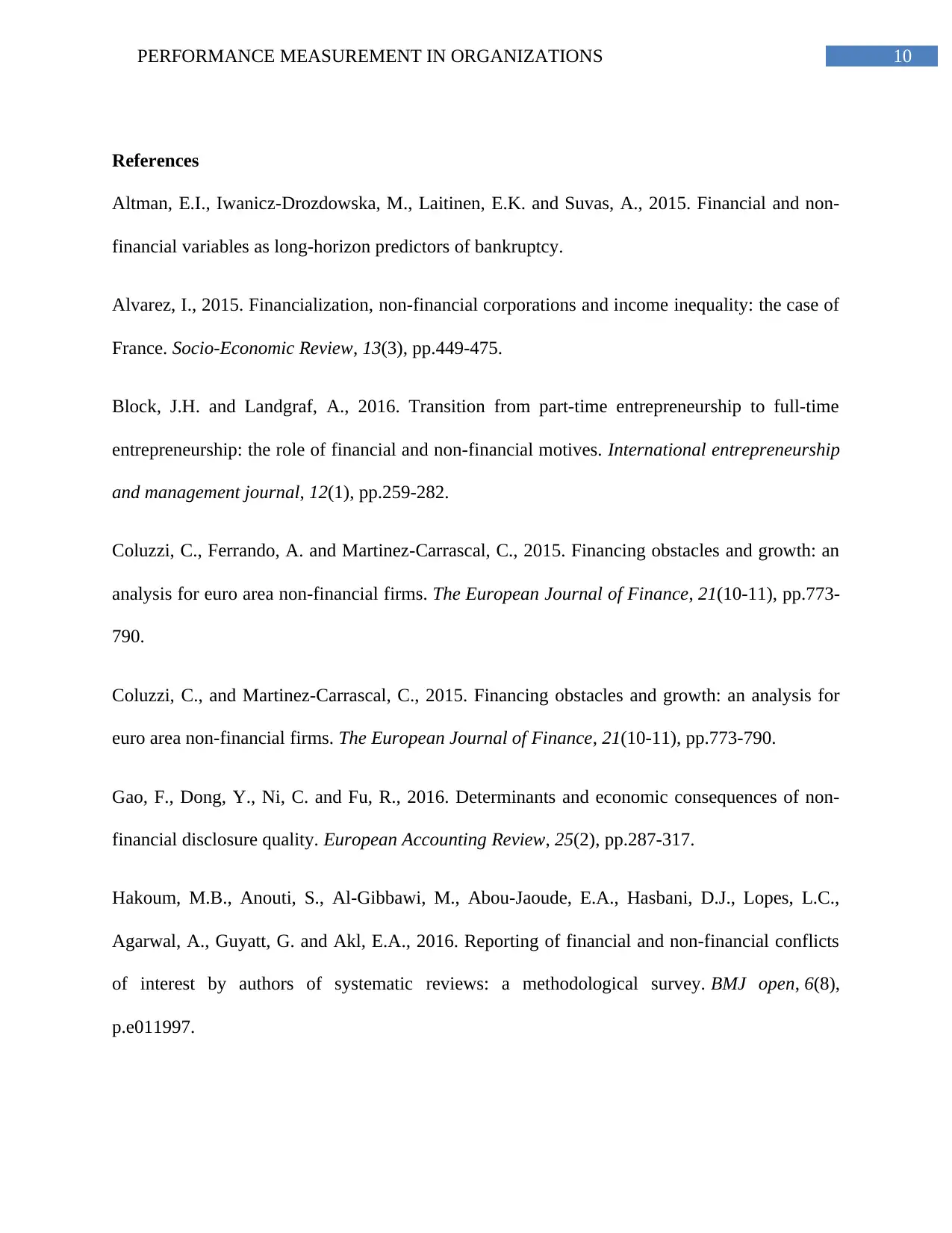
10PERFORMANCE MEASUREMENT IN ORGANIZATIONS
References
Altman, E.I., Iwanicz-Drozdowska, M., Laitinen, E.K. and Suvas, A., 2015. Financial and non-
financial variables as long-horizon predictors of bankruptcy.
Alvarez, I., 2015. Financialization, non-financial corporations and income inequality: the case of
France. Socio-Economic Review, 13(3), pp.449-475.
Block, J.H. and Landgraf, A., 2016. Transition from part-time entrepreneurship to full-time
entrepreneurship: the role of financial and non-financial motives. International entrepreneurship
and management journal, 12(1), pp.259-282.
Coluzzi, C., Ferrando, A. and Martinez-Carrascal, C., 2015. Financing obstacles and growth: an
analysis for euro area non-financial firms. The European Journal of Finance, 21(10-11), pp.773-
790.
Coluzzi, C., and Martinez-Carrascal, C., 2015. Financing obstacles and growth: an analysis for
euro area non-financial firms. The European Journal of Finance, 21(10-11), pp.773-790.
Gao, F., Dong, Y., Ni, C. and Fu, R., 2016. Determinants and economic consequences of non-
financial disclosure quality. European Accounting Review, 25(2), pp.287-317.
Hakoum, M.B., Anouti, S., Al-Gibbawi, M., Abou-Jaoude, E.A., Hasbani, D.J., Lopes, L.C.,
Agarwal, A., Guyatt, G. and Akl, E.A., 2016. Reporting of financial and non-financial conflicts
of interest by authors of systematic reviews: a methodological survey. BMJ open, 6(8),
p.e011997.
References
Altman, E.I., Iwanicz-Drozdowska, M., Laitinen, E.K. and Suvas, A., 2015. Financial and non-
financial variables as long-horizon predictors of bankruptcy.
Alvarez, I., 2015. Financialization, non-financial corporations and income inequality: the case of
France. Socio-Economic Review, 13(3), pp.449-475.
Block, J.H. and Landgraf, A., 2016. Transition from part-time entrepreneurship to full-time
entrepreneurship: the role of financial and non-financial motives. International entrepreneurship
and management journal, 12(1), pp.259-282.
Coluzzi, C., Ferrando, A. and Martinez-Carrascal, C., 2015. Financing obstacles and growth: an
analysis for euro area non-financial firms. The European Journal of Finance, 21(10-11), pp.773-
790.
Coluzzi, C., and Martinez-Carrascal, C., 2015. Financing obstacles and growth: an analysis for
euro area non-financial firms. The European Journal of Finance, 21(10-11), pp.773-790.
Gao, F., Dong, Y., Ni, C. and Fu, R., 2016. Determinants and economic consequences of non-
financial disclosure quality. European Accounting Review, 25(2), pp.287-317.
Hakoum, M.B., Anouti, S., Al-Gibbawi, M., Abou-Jaoude, E.A., Hasbani, D.J., Lopes, L.C.,
Agarwal, A., Guyatt, G. and Akl, E.A., 2016. Reporting of financial and non-financial conflicts
of interest by authors of systematic reviews: a methodological survey. BMJ open, 6(8),
p.e011997.
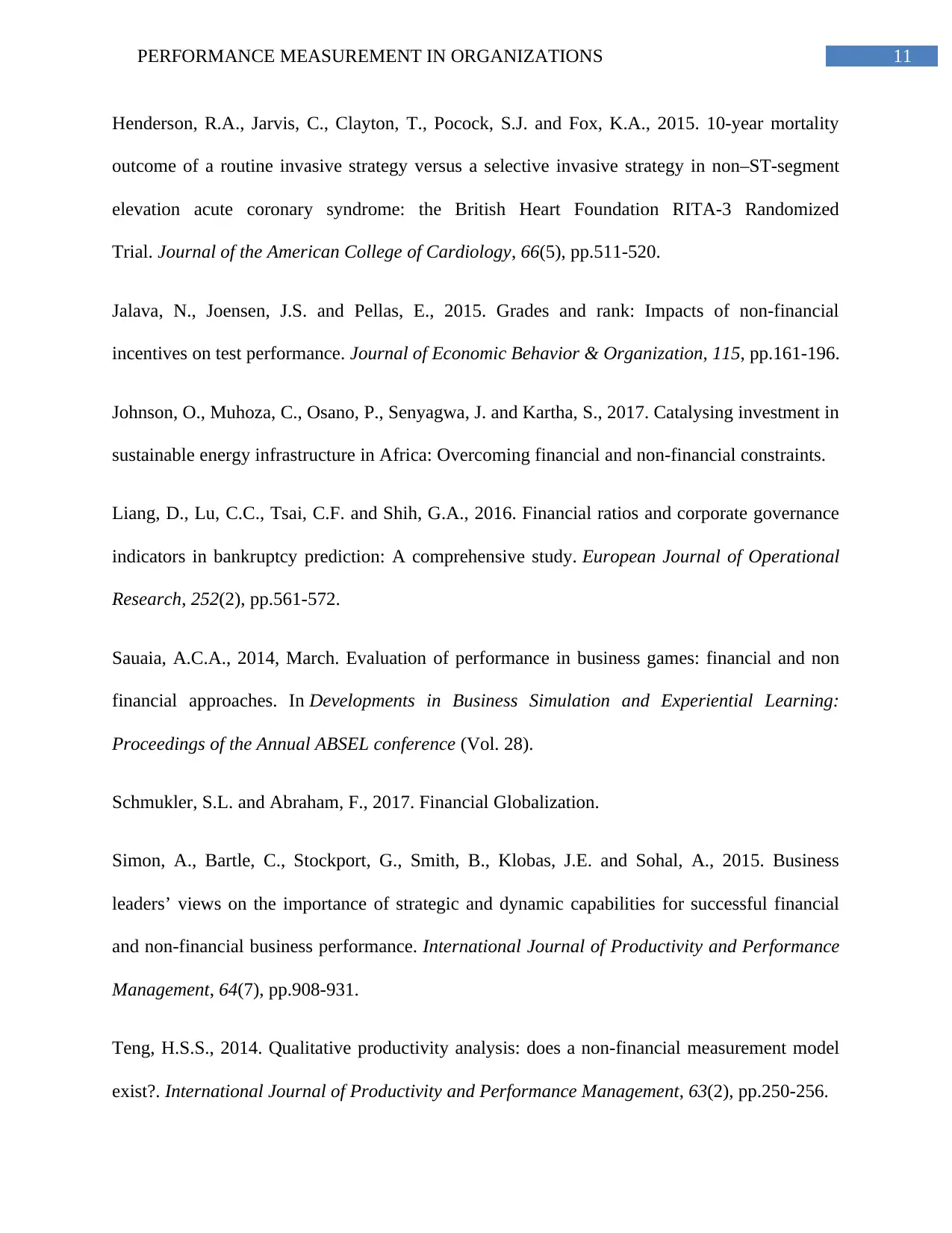
11PERFORMANCE MEASUREMENT IN ORGANIZATIONS
Henderson, R.A., Jarvis, C., Clayton, T., Pocock, S.J. and Fox, K.A., 2015. 10-year mortality
outcome of a routine invasive strategy versus a selective invasive strategy in non–ST-segment
elevation acute coronary syndrome: the British Heart Foundation RITA-3 Randomized
Trial. Journal of the American College of Cardiology, 66(5), pp.511-520.
Jalava, N., Joensen, J.S. and Pellas, E., 2015. Grades and rank: Impacts of non-financial
incentives on test performance. Journal of Economic Behavior & Organization, 115, pp.161-196.
Johnson, O., Muhoza, C., Osano, P., Senyagwa, J. and Kartha, S., 2017. Catalysing investment in
sustainable energy infrastructure in Africa: Overcoming financial and non-financial constraints.
Liang, D., Lu, C.C., Tsai, C.F. and Shih, G.A., 2016. Financial ratios and corporate governance
indicators in bankruptcy prediction: A comprehensive study. European Journal of Operational
Research, 252(2), pp.561-572.
Sauaia, A.C.A., 2014, March. Evaluation of performance in business games: financial and non
financial approaches. In Developments in Business Simulation and Experiential Learning:
Proceedings of the Annual ABSEL conference (Vol. 28).
Schmukler, S.L. and Abraham, F., 2017. Financial Globalization.
Simon, A., Bartle, C., Stockport, G., Smith, B., Klobas, J.E. and Sohal, A., 2015. Business
leaders’ views on the importance of strategic and dynamic capabilities for successful financial
and non-financial business performance. International Journal of Productivity and Performance
Management, 64(7), pp.908-931.
Teng, H.S.S., 2014. Qualitative productivity analysis: does a non-financial measurement model
exist?. International Journal of Productivity and Performance Management, 63(2), pp.250-256.
Henderson, R.A., Jarvis, C., Clayton, T., Pocock, S.J. and Fox, K.A., 2015. 10-year mortality
outcome of a routine invasive strategy versus a selective invasive strategy in non–ST-segment
elevation acute coronary syndrome: the British Heart Foundation RITA-3 Randomized
Trial. Journal of the American College of Cardiology, 66(5), pp.511-520.
Jalava, N., Joensen, J.S. and Pellas, E., 2015. Grades and rank: Impacts of non-financial
incentives on test performance. Journal of Economic Behavior & Organization, 115, pp.161-196.
Johnson, O., Muhoza, C., Osano, P., Senyagwa, J. and Kartha, S., 2017. Catalysing investment in
sustainable energy infrastructure in Africa: Overcoming financial and non-financial constraints.
Liang, D., Lu, C.C., Tsai, C.F. and Shih, G.A., 2016. Financial ratios and corporate governance
indicators in bankruptcy prediction: A comprehensive study. European Journal of Operational
Research, 252(2), pp.561-572.
Sauaia, A.C.A., 2014, March. Evaluation of performance in business games: financial and non
financial approaches. In Developments in Business Simulation and Experiential Learning:
Proceedings of the Annual ABSEL conference (Vol. 28).
Schmukler, S.L. and Abraham, F., 2017. Financial Globalization.
Simon, A., Bartle, C., Stockport, G., Smith, B., Klobas, J.E. and Sohal, A., 2015. Business
leaders’ views on the importance of strategic and dynamic capabilities for successful financial
and non-financial business performance. International Journal of Productivity and Performance
Management, 64(7), pp.908-931.
Teng, H.S.S., 2014. Qualitative productivity analysis: does a non-financial measurement model
exist?. International Journal of Productivity and Performance Management, 63(2), pp.250-256.

12PERFORMANCE MEASUREMENT IN ORGANIZATIONS
Theriou, N.G., 2015. Strategic Management Process and the Importance of Structured Formality,
Financial and Non-Financial Information. European Research Studies, 18(2), p.3.
Theriou, N.G., 2015. Strategic Management Process and the Importance of Structured Formality,
Financial and Non-Financial Information. European Research Studies, 18(2), p.3.
1 out of 13
Related Documents
Your All-in-One AI-Powered Toolkit for Academic Success.
+13062052269
info@desklib.com
Available 24*7 on WhatsApp / Email
![[object Object]](/_next/static/media/star-bottom.7253800d.svg)
Unlock your academic potential
© 2024 | Zucol Services PVT LTD | All rights reserved.





